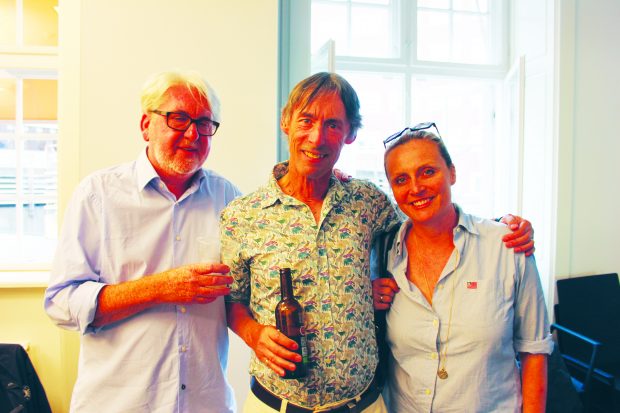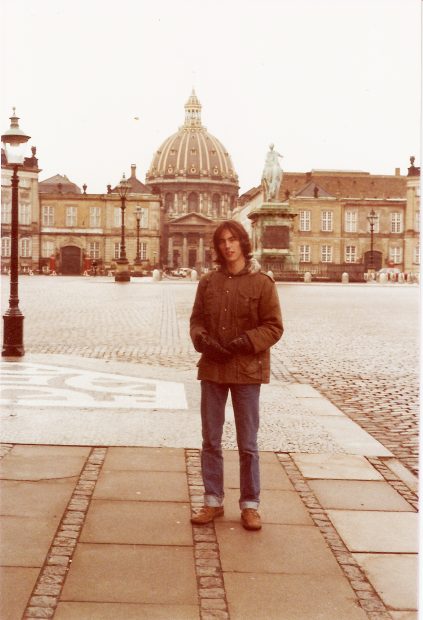News
You deserved more than 64: pleasure to know you, old chap
This article is more than 3 years old.
CPH POST columnist and journalist Stephen Gadd, a much loved husband, father and friend, succumbs to cancer

His column ‘Straight, No Chaser’ was a reference to jazzman Thelonious Monk. Right: with his wife Janne
I first met Stephen Gadd in the summer of 2015, although it transpired we’d been to some of the same events – the opening of the ill-fated The Red Lion, for example – and many of the same bars, most notably Charlie’s, where he was a much loved regular with his own tankard and was celebrated with a wake on August 14.
The first thing that struck you about Stephen was the hat. And then the scarf … the coat … and the pocket watch. Finally there was his whole demeanour and distinctive well-spoken English accent. He was the archetypal English gentleman, and nobody ever had a bad word to say about him.
He was most certainly never dull, though – as long as you didn’t approach the subject of German silent movies. A lively mind, he was never short of a quip or some wordplay, often delivered with a wolfish grin, and he appreciated a good joke too.
Above everything, he was excellent company, and in between 2017 and 2020 he infused the offices of the Copenhagen Post with great humour when we took him on as our third journalist.
We’ll never forget those years – perhaps most notably his Basil Fawlty-style temper, which his siblings confirmed at his August 5 funeral had been a great source of amusement his entire life.
At the end of the song
Before then, he was one of our columnists, writing his first in August 2015 and his last ahead of our most recent publication – a feature he provided with the headline “The silence is deafening”. Shakespeare was one of his many interests, although it came a distant third to the films and jazz, of which he had a formidable record collection.
It’s only now, hours after learning about his death on July 24 at the age of 64 after a prolonged battle with cancer, that I can see, somewhat poignantly, there is a thread running through the 30+ columns he wrote for us, which begins and ends with Paul McCartney.
The irony that Stephen’s life came to an end at the age of 64 can not be understated, and the song neatly, and again sadly, bookends his life and how much the world has changed since the year of his birth, 1957.
When McCartney wrote the song in either 1956 or 57, 64 was a respectable age to live until – it was certainly not middle-aged.
But in the six decades that have followed, it is no longer considered elderly, and very much a young age at which to die. Stephen’s death came too soon, tragically just two years after an early retirement was granted on compassionate grounds.

Counted his blessings
“Earlier this year when the Roskilde Festival unveiled its program and Paul McCartney was named as headliner, there was a fair amount of critical tutting: he’s too old, past it, irrelevant to today’s young music lovers, watering down the brand of the Roskilde Festival etc, etc,” he wrote back in 2015.
And then in March 2022, he returned to the subject, opening his column with the lines: “In mid-November last year I was lucky enough (or unlucky if you prefer) to turn 64. Reading the lyrics to ‘When I’m Sixty-four’ I’m struck by the acuity of observation and maturity shown by Paul McCartney. He actually wrote the song when he was 14 (!), but it was not changed very much when it was finally recorded in 1967.”
He drew attention to the lyrics “Every summer we can rent a cottage / In the Isle of Wight, if it’s not too dear / We shall scrimp and save / Grandchildren on your knee / Vera, Chuck and Dave,” commenting: “This strikes a particular chord with me as our family did just that – going on holiday to the Isle of Wight or renting a cottage. I’m also lucky enough to have two grandchildren of my own, albeit not Vera, Chuck or Dave.”
It’s comforting to know that Stephen had such a strong family network supporting him through his final days: most notably his wife Janne, who he married in 1981, and his daughter Ann, who was born shortly afterwards.
He was also able to say his goodbyes to his younger sister and brother, who both travelled from the UK to spend time with him in the spring.
Unparalleled knowledge
Stephen George Gadd arrived in Denmark in August 1978 after meeting Janne in England, where she was studying architecture. In contrast, Stephen prided himself on being autodidactic – meaning he was entirely self-taught.
As anyone who has been to his home in Søborg where he and Janne brought up their daughter Ann in the 1980s and 90s will testify, Stephen had an awful lot of books.
As Stephen’s editor at CPH POST, I quickly realised the man is a walking encyclopedia on many subjects – most notably geopolitics. There wasn’t a country on earth that he didn’t have an almost innate understanding of. It was invaluable when we needed to interview ambassadors; often Stephen knew more about their countries than they did! But more importantly than assignments, I recruited him to my quiz team, and he became a regular member.

At The Globe pub, our team Godiva’s Cat won umpteen times with Stephen onboard, although Stephen was a little peeved at the end of what turned out to be his final outing.
After finishing in a five-way tie for first place, the eliminator question was a complete case of chance: some sort of absurd Guinness World Record for swallowing burps etc. Stephen wrote an email to the pub, ticking it off for using “unsatisfactory questions as tie-breakers” reasoning “you could just as well decide things by rolling dice or picking a card”.
It underlined how Stephe’s inner compass was one his family and friends could always depend on. He was trusted implicitly by all who knew him.
Feet’s loss our gain
Stephen spent the bulk of his professional career at the Baltic and International Maritime Council (BIMCO), the world’s largest international shipping association, where he was responsible for the compilation of a magazine read by 2,300 members in around 130 countries. He joined BIMCO in 1978 and was overall editor from 2000 until 2015.
Clearly, he was an accomplished editor and proofreader with an exceptionally high level of English. He was also fluent in Danish and, very proudly, he was made a citizen in his later life – a decision prompted by Brexit, which he deeply opposed.
As a writer, he was masterful, and while he was not journalistically trained, he understood the business intuitively. But perhaps most importantly, he was as quick as the wind. He could, if needed, write 1,000 words of copy in an hour – he instinctively knew the level of quality the piece needed to be to be publishable.
Likewise he instinctively knew that a career as a chiropodist was not for him when he dropped out of the Chelsea School of Chiropody shortly before moving to Denmark.
He quickly found his feet in Denmark (he wrote about his adventures in a recent article for CPH POST) – back then he looked like Paul Weller and was always good company in the pub, particularly Charlies Bar on Pilestræde, which provided him with a second home in Denmark.
Like at the CPH POST, he was deeply loved there. It goes without saying that he will be sadly missed by all who knew him.











































